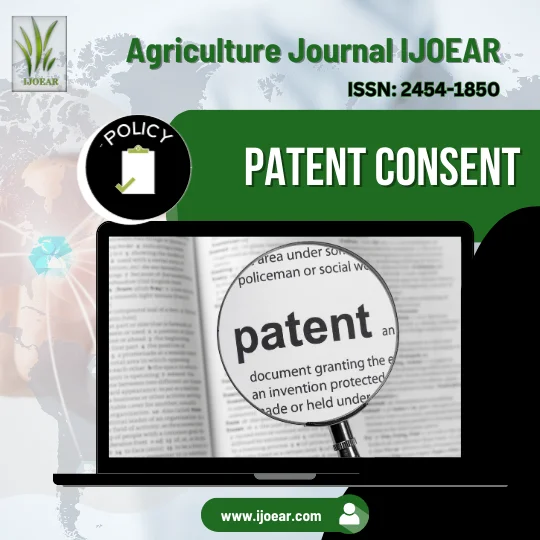 February 2026 Articles
February 2026 Articles R Impact Factor: 4.38
R Impact Factor: 4.38  Submit Article
Submit Article
|
Citation Indices
|
All
|
Since 2020
|
|
Citation
|
6164
|
5117
|
|
h-index
|
31
|
29
|
|
i10-index
|
201
|
165
|
|
Acceptance Rate (By Year)
|
|
|
Year
|
Percentage
|
|
2024
|
11.09%
|
|
2023
|
15.23%
|
|
2022
|
12.81%
|
|
2021
|
10.45%
|
|
2020
|
9.6%
|
|
2019
|
14.3%
|
|
2018
|
17.65%
|
|
2017
|
16.9%
|
|
2016
|
22.9%
|
|
2015
|
26.1%
|

The International Journal of Environmental and Agriculture Research (IJOEAR), ISSN 2249-8958 (online), is a global, peer-reviewed journal committed to publishing high-quality research in agriculture and environmental sciences. In accordance with international legal and ethical standards, authors wishing to include patents, case details, personal information, or identifiable images in their submissions must secure appropriate consents, permissions, and releases prior to publication. This policy ensures compliance with intellectual property laws, respects individual privacy, and upholds the integrity of the journal’s content.
This document outlines the requirements for obtaining patent consent, the author’s responsibilities, and the measures to be taken to ensure ethical and lawful use of such materials.
A patent is a legal instrument that provides its owner the exclusive right to make, use, or sell an invention for a specified period in exchange for public disclosure of the invention. Patents are critical in safeguarding intellectual property and fostering innovation, especially in industries like agriculture, biotechnology, and environmental technology.
However, the inclusion of patented materials or any content related to patents in a research article requires the explicit consent of the patent holder.
Patent consent ensures that:
Authors must secure written consent from the patent holder before including any patented content, such as technical details, diagrams, or images, in their submission. This consent must clearly outline:
If the use of patented materials involves individuals or personal data, the author must:
Authors bear full responsibility for ensuring compliance with the patent consent policy. This includes:
The IJOEAR editorial team is committed to ensuring that all submitted manuscripts adhere to the journal’s patent consent policy. The editorial team:
Authors must provide accurate and complete information about the patented material. This includes:
The contribution of the patent holder should be properly acknowledged in the manuscript.
If required by the patent holder, specific wording for acknowledgment must be included.
Patented content must not be manipulated or misrepresented to distort its original purpose or function.
IJOEAR takes violations of the patent consent policy seriously. Authors found to be in breach of this policy may face the following consequences:
An author wishes to include a patented diagram of an agricultural irrigation system in their manuscript. The author must:
An author’s study involves a patented technique for soil erosion prevention. The author must:
If an author includes photographs of individuals using patented equipment, they must:
Yes, written consent is required for all patented content, including diagrams, technical details, and images.
While the journal does not directly facilitate obtaining consent, it provides authors with guidelines and templates to streamline the process.
Authors must exclude the patented content from their manuscript if consent cannot be obtained.
Exceptions may apply for public domain patents, provided authors provide evidence of their status.
The Patent Consent Policy ensures that IJOEAR adheres to international ethical standards and intellectual property laws while fostering a culture of respect and accountability among authors. By following this policy, authors contribute to maintaining the integrity and credibility of the journal. If you have questions or require clarification regarding patent consent, please contact the editorial team for guidance.
For any queries or additional information, authors can contact the editorial team via email at info.ijoear@gmail.com or info @ijoear.com.com .